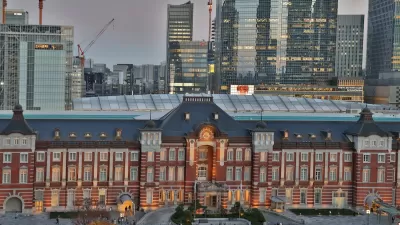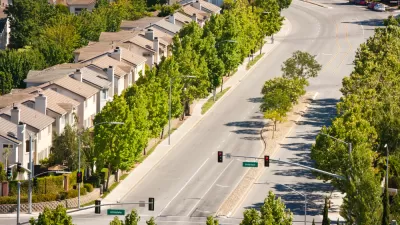Toronto, Tokyo, and Helsinki may have little in common, but they all top Metropolis Magazine's list of the world's most liveable cities, as named by an expert panel of designers and urbanists. Eight runnners-up were named in a variety of categories.

Toronto, for its job growth, greenbelt, and $20 billion in upcoming public investment; Tokyo for its safety, transit network, cost of living, and restaurants; and Helsinki, for its accessibility, population growth, bicycle infrastructure, and hospitality. The jury named eight runners-up for excellence in specific categories, like transport, landscape, and walkability. They include some usual suspects, like Copenhagen, Hong Kong, Melbourne, and Singapore, as well as some surprises, like Indianapolis, Medillin, Pittsburgh, and Rotterdam. Finally, some "up-and-coming" cities were named, including Christchurch, Doha, Tallinn, and Reno.
On Toronto: "Toronto is in the midst of a transformation that will make one of the most livable cities on earth even more attractive. Condo and office towers continue to pop up at a fast and furious rate as people—especially seniors and young professionals—flood into a downtown where they can enjoy Canada’s most urban environment. Growth in the inner core now outpaces suburbia for the first time since the 1970s—in 2014 alone, more than 20,000 residential units were completed.....The most obvious testament to the vitality of immigrant culture is Toronto’s burgeoning food scene. A city that barely knew what garlic was 50 years ago now relishes cuisines from the world over. Consider the case of Uncle Tetsu, the celebrated Japanese cheesecake maker who chose Toronto to open its first store outside Asia. The unassuming shop sells only the one item, but from the moment it appeared last April, the lineups have been blocks long."
On Tokyo: "It’s also this type of density and mixed programming that makes Tokyo one of the leading cities for 'aging in place.' With one of the oldest populations in the world, Tokyo, says aging-in-place expert Mark Hager, 'has committed considerable resources to rethinking how its communities are designed.' He cites centuries of multi-generational housing as one reason Tokyo has been quick to 'create communities where older people can continue living where they wish, have many generations and neighbors near, and still get the care or assistance they need.' Technology-driven efforts to service this demographic—ceiling cameras to monitor movement, beds that convert into wheelchairs, high-tech chair lifts—appear far ahead of similar developments in the United States."
On Helsinki: "The city is launching an on-demand bus service, called Kutsuplus, and planning to fold car- and bike-sharing into an ambitious smartphone-enabled public-transport system by 2025—the end goal being that car ownership will be unnecessary. This idea may seem extreme, but when one considers the city’s forward-thinking attitude and accessible technology—the ubiquitous free WiFi in the city is fast enough to allow video calling and HD streaming—it suddenly doesn’t seem so unattainable. 'As we question how designers are shaping, imagining, and forecasting futures,' says Harris, 'Helsinki, with all that’s going on, is in a very good position to answer that.'"
FULL STORY: The World's Most Livable Cities

Alabama: Trump Terminates Settlements for Black Communities Harmed By Raw Sewage
Trump deemed the landmark civil rights agreement “illegal DEI and environmental justice policy.”

Planetizen Federal Action Tracker
A weekly monitor of how Trump’s orders and actions are impacting planners and planning in America.

Why Should We Subsidize Public Transportation?
Many public transit agencies face financial stress due to rising costs, declining fare revenue, and declining subsidies. Transit advocates must provide a strong business case for increasing public transit funding.

Understanding Road Diets
An explainer from Momentum highlights the advantages of reducing vehicle lanes in favor of more bike, transit, and pedestrian infrastructure.

New California Law Regulates Warehouse Pollution
A new law tightens building and emissions regulations for large distribution warehouses to mitigate air pollution and traffic in surrounding communities.

Phoenix Announces Opening Date for Light Rail Extension
The South Central extension will connect South Phoenix to downtown and other major hubs starting on June 7.
Urban Design for Planners 1: Software Tools
This six-course series explores essential urban design concepts using open source software and equips planners with the tools they need to participate fully in the urban design process.
Planning for Universal Design
Learn the tools for implementing Universal Design in planning regulations.
Caltrans
Smith Gee Studio
Institute for Housing and Urban Development Studies (IHS)
City of Grandview
Harvard GSD Executive Education
Toledo-Lucas County Plan Commissions
Salt Lake City
NYU Wagner Graduate School of Public Service




























